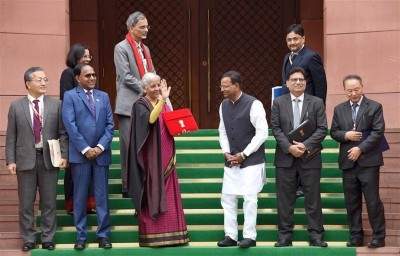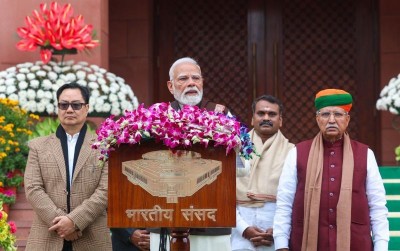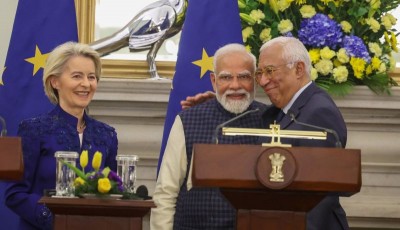 Kigali Amendment
Kigali Amendment
India ratifies Kigali Amendment to Montreal Protocol on reducing hydrofluorocarbons
New Delhi/IBNS: The Kigali Amendment to the Montreal Protocol, which is an international agreement to gradually reduce the consumption and production of hydrofluorocarbons (HFCs), has been approved for ratification by India on Wednesday.
Focused on super pollutant gases called Hydro fluoro carbons (HFCs), this protocol alone has a potential to avoid 0.5 degrees of warming of the atmosphere by the end of the century.
Hydrofluorocarbons (HFCs) are man-made organic compounds that contain fluorine and hydrogen atoms, and are the most common type of organofluorine compounds. They are frequently used in air conditioning and as refrigerants.
India’s ratification follows China’s earlier this year, and will be the 123rd ratification of the important treaty amendment.
As the world is on Code Red, and immediate actions which can bring down the temperature in the short term are required, this is all in all a good move from India.
Given India is committed to play a constructive role in climate action, the approval builds confidence that India will further advance its targets and achievements under climate action as the COP26 approaches.
India is one of the first countries in the world to launch a cooling action plan in 2019.
The plan is linked to the economic growth and need for cooling and refrigeration over the next few decades. This comprehensive plan is aimed at reducing cooling demand, enabling refrigerant transition, enhancing energy efficiency and better technology
options with a 20 year time horizon.
Signing of the Kigali amendment will give a good signal to the market to make the transition away from HFC gases faster.
Further, for India, the date for phasedown of the HFC gases kicks in, in the year 2028, even so, the ratification is a sign that industry wants clarity and will encourage the air conditioning and refrigeration industry to develop more efficient cooling technologies faster.
A fact sheet from TERI and NDRC lists the main advantages to India in ratifying the Kigali Amendment
To boost India’s domestic manufacturing and employment generation goals. The ratification would signify that India is ready to compete in the market for low-global warming potential GWP (climate-friendly) refrigerants, which will spur domestic innovation and attract international investments.
To achieve India’s climate change and cooling commitments. India is one of the few countries on track to meet its climate commitments under the Paris Agreement.
Ratifying Kigali would further accelerate this progress.
To showcase a position of strength at the Montreal Protocol. Ratifying the Kigali Amendment would strengthen India’s influence and goodwill around the globe and help bolster India’s efforts to establish smart policies and bylaws, including energy efficiency
while phasing down HFCs.
To build upon the progress India has made on phasing down HFCs. India has been moving forward with implementing the India Cooling Action Plan, which sets domestic targets for cooling efficiency and refrigerants but may not be enough by itself for India to meet Kigali timelines. Ratification would help lay a clear policy framework to prevent imports that utilize highly potent (high-GWP) HFCs, such as R-134a, R410a, and R-404a.
Experts' Reactions
Prima Madan-Lead Consultant, Energy Efficiency and Cooling, Natural Resources Defense Council (NRDC) India Program says, "India has exemplified its climate leadership by ratifying the Kigali Amendment. There is a big opportunity for the country to be on course for an early phasedown of HFCs, through domestic innovation, which would also make Indian industry globally competitive in climate friendly cooling products. India's move fits in well with its plan for a green recovery, as we build back better.”
Alex Hillbrand- HFC Advocate, Climate and Clean Energy and International Program, Natural Resources Defense Council (NRDC) says, “The Montreal Protocol community has long looked to India for its leadership on ozone and climate protection and today it has, yet again, answered the call. India’s Kigali Amendment ratification is among the most significant of any country, and brings us to the cusp of universal ratification among the world’s biggest economies.”
Prof S N Tripathi, Head of Civil Engineering, IIT Kanpur and Steering Committee Member, National Clean Air Programme, MoEFCC says, “The Montreal protocol had realised the need for phasing out Hydrofluorocarbons (HFCs) which were responsible for the depletion of the Ozone layer. The tireless efforts that led to the Kigali amendment has resulted in the agreement of phasing out HFCs in a time bound fashion. Many HFCs have very high global warming potential. India’s ratification of the Kigali amendment is a welcome decision that will collectively help avoid 0.5 degree C which is a significant climate co-benefit.”
Shikha Bhasin, Senior Programme Lead, Council on Energy, Environment and Water (CEEW) says, “India beckons calls to leadership again with the ratification of the Kigali Amendment. As the first country to come up with a National Cooling Action Plan, an industry transitioning towards climate-friendly gases, and now this global political ratification of the Kigali Amendment well before it’s peaking year is yet another feather in India’s cooling and climate cap before the upcoming COP26 this year.
"It’s the right signal to ensure low-GWP and alternative cooling technologies’ deployment not just in one of the
world’s largest cooling markets, but also for several countries around the world considering climate actions in this pivotal year.
"We need to now compound our strategic attention towards collaborative R&D and business model innovations to increase deployment of clean cooling solutions; and simultaneously ensure market readiness through a well-trained servicing sector and
standards that support industrial growth and a competitive market in India.”
Support Our Journalism
We cannot do without you.. your contribution supports unbiased journalism
IBNS is not driven by any ism- not wokeism, not racism, not skewed secularism, not hyper right-wing or left liberal ideals, nor by any hardline religious beliefs or hyper nationalism. We want to serve you good old objective news, as they are. We do not judge or preach. We let people decide for themselves. We only try to present factual and well-sourced news.







